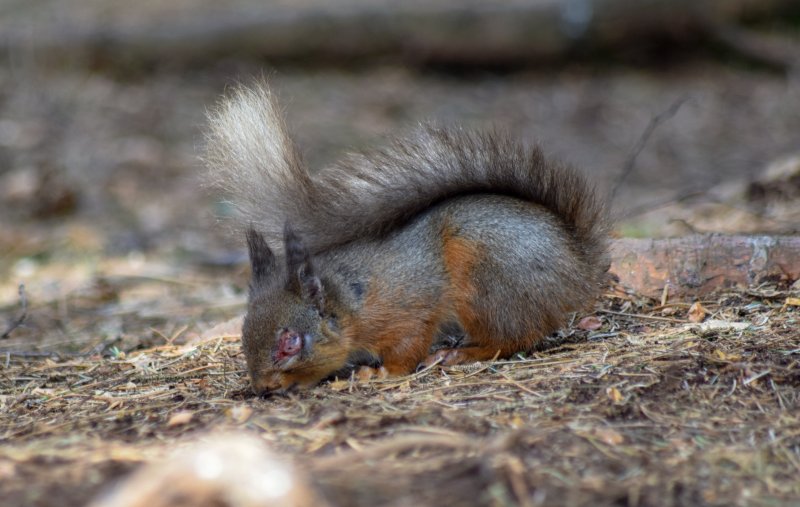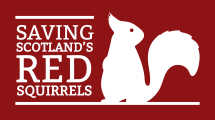Original Author: Saving Scotland’s Red Squirrels
Saving Scotland’s Red Squirrels has received multiple reports of red squirrels with suspected Squirrelpox virus in Heathall Forest on the outskirts of Dumfries. Locals are urged to remain vigilant as this fatal disease could have serious consequences for the local red squirrel population.
Within the past fortnight, several individual red squirrels have been spotted by both project staff and members of the public which appear to display classic symptoms of the deadly disease.
Squirrelpox is a virus that is carried by grey squirrels without them being affected. Native red squirrels do not typically have immunity. Symptoms include weeping lesions on the face, paws and genitalia, which prevent the red squirrel from eating, drinking or moving. As a result, it is usually fatal within two weeks and an outbreak can cause local numbers to crash.
Wildlife feeder boxes and garden bird tables are a common cause of Squirrelpox outbreaks, as they bring squirrels of both species into closer contact with one another.

Dr Stephanie Johnstone, Conservation Officer for Saving Scotland’s Red Squirrels said: “In conjunction with Forestry Commission Scotland, who manage Heathhall, we have deployed emergency Squirrelpox outbreak response measures. All feeder boxes found on site have been removed and trapping has commenced to isolate any sick red squirrels and remove any grey squirrels. Captured sick red squirrels will be taken to a local veterinary clinic in Dumfries where they will be assessed and either treated or euthanised.
“There are very few instances of red squirrels surviving the disease. Nonetheless, the South West Scotland Wildlife Hospital is on standby to receive any sick red squirrels into their isolation unit if a vet deems that they may have a chance of recovery.”
Locals can help prevent further spread of the disease by removing any feeder boxes that have been placed in Heathhall Forest and the surrounding area. People that have red squirrels visiting feeders in their gardens, including bird feeders, should ensure that they are regularly and thoroughly cleaned with an anti-viral solution, available from local farm supply shops.
The first known Squirrelpox outbreak in Scotland occurred in 2007 near Lockerbie and since then the disease has arisen in various local red squirrel populations across the south. Seropositive (pox carrying) grey squirrels are now considered to be widespread throughout South Scotland and the disease could therefore be transferred to local red squirrel populations in any area.
However, despite there being other outbreaks in areas such as Thornhill over the years, targeted grey squirrel control work has ensured that the local red squirrel populations have successfully recovered. Mathematical modelling has shown that when grey squirrel numbers are kept low, red squirrels are given enough time to breed and repopulate an area after suffering a major decline.
Local residents have created a Facebook page ‘Save Heathhall Red Squirrels‘ to keep the public informed of the current situation.
Lisa Fuller was one of the first people to photograph one of the affected squirrels. She said: “Red squirrels are one of my favourite animals and I wanted to try and help. Seeing the sweet little animals in so much pain has been difficult and at times almost reduced me to tears. The support has been amazing, and with some family members we’ve done everything we can to get the word out by putting posters throughout the forest. The community would be devastated to lose these animals as we all love to spot them on our daily walks.”
People can support the Saving Scotland’s Red Squirrels project by reporting their sightings of both red and grey squirrels at scottishsquirrels.org.uk. Although Squirrelpox is not considered harmful to humans, anyone who sees a sick red squirrel is advised not to approach it, but instead contact the project for advice.
Saving Scotland’s Red Squirrels is a partnership project led by the Scottish Wildlife Trust and made possible thanks to National Lottery players and the Dumfries & Galloway LEADER 2014 – 2020 programme.
For further information please contact Gill Hatcher, ghatcher@scottishwildlifetrust.org.uk, 0131 3124717, 07388 994610.
